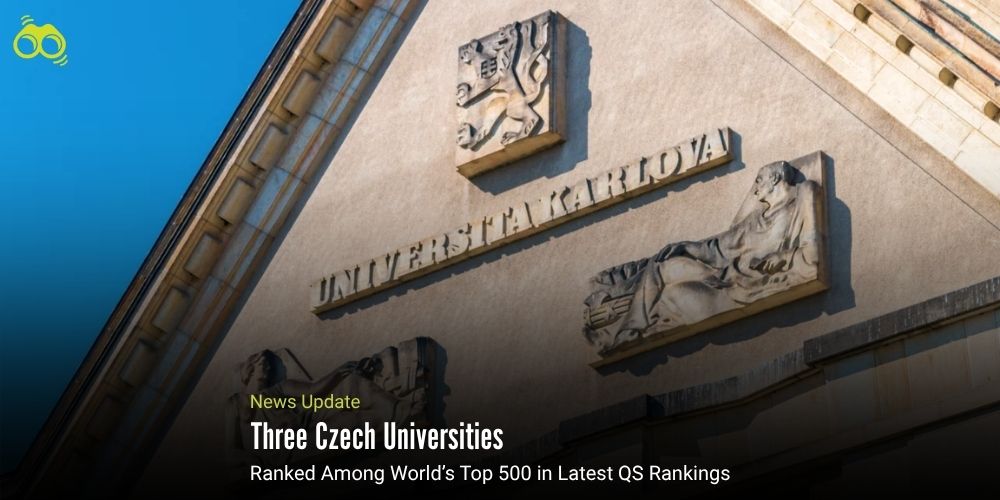Charles, ČVUT, and Masaryk Navigate New Metrics in Global Academic Rankings
Innovation and Ambition: Czech Institutions Face Global Ranking Challenges
In today’s interconnected academic landscape, global rankings are more than a measure of prestige; they reflect a university’s adaptability, ambition, and relevance in a changing world. As higher education evolves to meet shifting societal needs, benchmarks like the QS World University Rankings serve as tools for assessing performance, identifying areas for improvement, and setting strategic goals beyond national boundaries.
According to the latest QS World University Rankings, three Czech universities have maintained positions among the top 500 globally. Published by British analytics firm Quacquarelli Symonds (QS), the 2026 rankings assessed over 1,500 universities worldwide using a broad range of indicators. While Czech institutions remained in the upper tier, their standings shifted from the previous year. Charles University in Prague (Univerzita Karlova), the oldest and most prestigious institution in the Czech Republic, once again led the national rankings. Although it retained its top position domestically, its global ranking reportedly declined from 246th to 265th. Founded in 1348, it remains a key contributor to academic excellence in the region.
In contrast, the Czech Technical University in Prague (ČVUT), the country’s largest technical institution, reportedly improved its standing, rising four places to 416th. Vice-Rector Zbyněk Škvor welcomed the result, saying it reflected ČVUT’s strong international profile and academic appeal. He also expressed optimism about the university’s goal of reaching the top 400 next year.
Masaryk University in Brno, the second-largest Czech university, reportedly dropped in rank from 408th to 430th. Rector Martin Bareš expressed disappointment and stressed the need for more ambitious goals. In remarks to the Czech News Agency, he noted that pride in national leadership alone is insufficient, as only global comparisons truly reflect an institution’s performance in today’s academic environment. Beyond the top three, 16 Czech universities were included in the 2026 QS rankings. Eight reportedly placed in the top 1,000, one fewer than last year. The University of South Bohemia in České Budějovice was noted to have fallen from the 951–1,000 range to 1,001–1,200.
Brno University of Technology (575th), Palacký University Olomouc (668th), and the University of Chemistry and Technology in Prague (638th) reportedly retained their positions within the top 700 globally. The QS World University Rankings, now in their 21st edition, are among the most widely referenced in international higher education. Institutions were assessed across nine criteria, including academic and employer reputation, faculty-student ratio, research citations per faculty, international faculty and student ratios, and newer metrics such as sustainability and employment outcomes.
Massachusetts Institute of Technology (MIT) reportedly held the top spot for the 14th consecutive year, followed by the Royal University of London and Stanford University. The University of Oxford and Harvard University rounded out the top five. QS has gradually refined its methodology to reflect current societal and industry priorities, particularly in areas like environmental sustainability and graduate employability. These changes are believed to increase pressure on universities worldwide to adapt, especially in smaller countries like the Czech Republic, where financial and structural constraints can pose challenges. While Czech institutions remain visible on the global stage, sustained innovation and strategic ambition will be essential to improving their standing in an evolving academic landscape.
Editor’s Note:
The latest QS World University Rankings offer valuable insight into how Czech universities are positioned on the global stage. While it is encouraging to see institutions like Charles University, the Czech Technical University, and Masaryk University continue to rank within the top 500, the changes in their positions also reflect the evolving nature of international higher education. Universities today face growing expectations in research and teaching and in areas like sustainability, graduate employability, and global engagement. The gradual changes in the QS ranking criteria remind us that excellence is not static; it must be renewed through innovation and focused strategy.
Skoobuzz underscores that Czech universities have shown resilience, but greater ambition and sustained investment will be needed to strengthen their global standing in the years ahead.














0 Comments (Please Login To Continue)